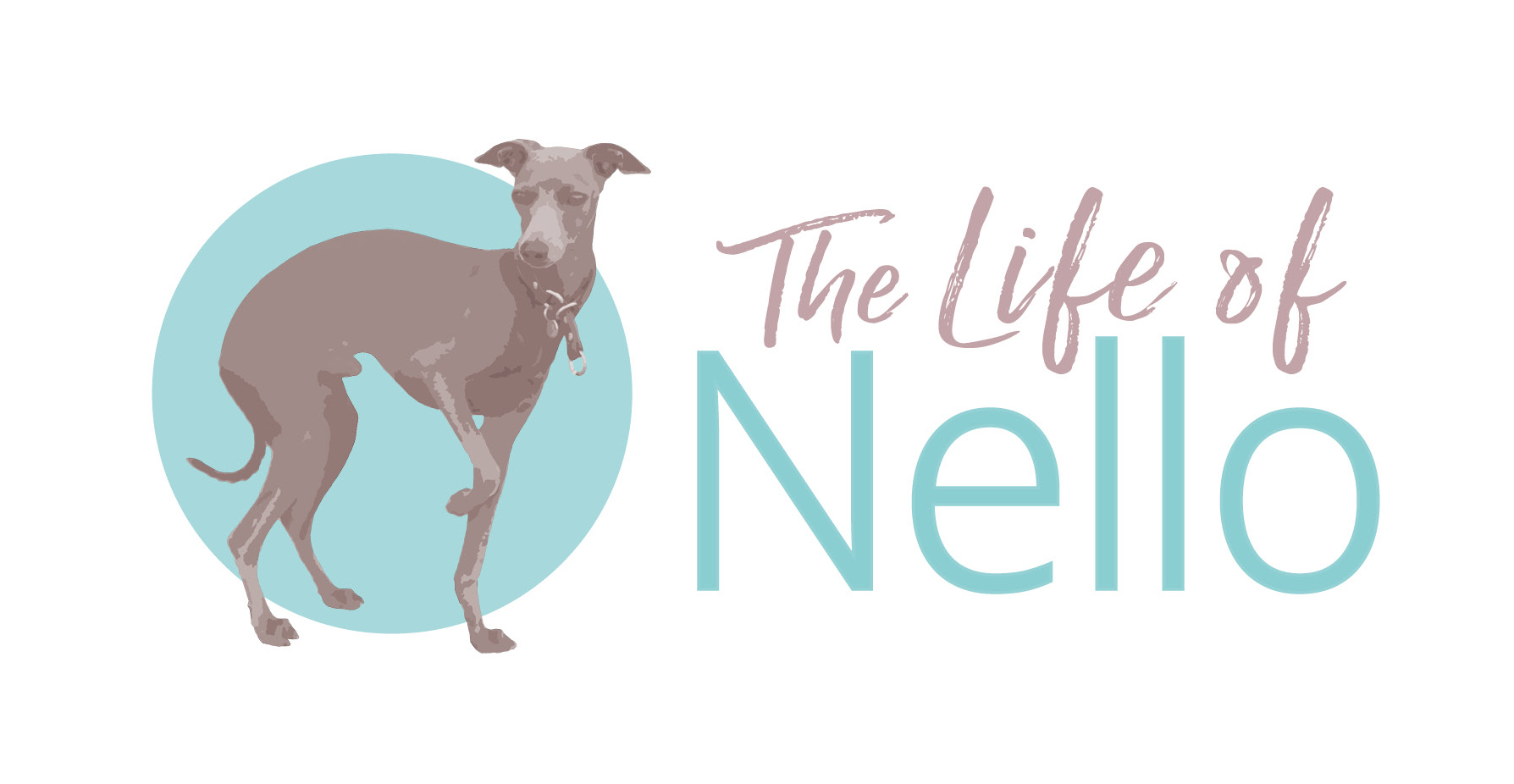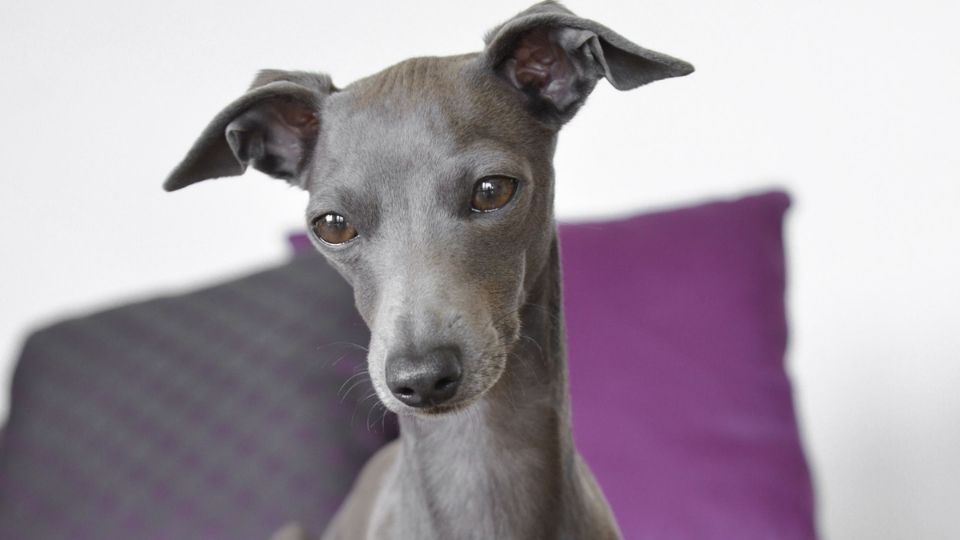
Italian Greyhounds are beautiful dogs which come in a big variety of colors. You will find countless shades and combinations.
But did you know not all colors are available in every part of the world? There are huge differences in the European and American standard for the breed and that is why you will find a different look of Iggies depending on where you live.
Whether you are thinking about getting an Italian Greyhound or just curious to find out more about the breed, you will find answers on all Italian Greyhound color related questions here.
Important: Color genetics is a very complex subject and we are by far no experts on the gentical differences between the various colors. This blog post is not supposed to be a scientific work, we just want to give you an overview of what colors can be found in Italian Greyhounds to show the big variety of this beautiful breed. We hope you like it!
Italian Greyhound Colors – European vs American Type
First of all you should know the available colors are not the same everywhere.
In Europe, you will mostly find solid Italian Greyhounds with no white markings or only white markings on their chest and feet. That’s because the European standard doesn’t allow multi-colored coats.
In the United States and other countries outside of Europe you will find any colors and markings other than
- brindle (which is common for Whippets) or
- tan markings that are typical for the Pinscher and Rottweiler.
Which Italian Greyhound Colors Will Be Found in Europe?
In Europe, you will mostly find solid Iggies – meaning their coat only has one single color. While Iggies may be darker or lighter over some parts of their body, they will not have any white markings other than on their chest and feet.
Here is an overview of the common Italian Greyhound colors in Europe:
Grey Iggies – A very popular Italian Greyhound Color
Grey (or often referred to as blue) is probably one of the most popular colors at the moment. No wonder – it just looks so elegant and special. While it is quite common for Iggies, it is generally very rare for dogs in general.
Grey is considered to be a diluted coat color. Several gene variants are known to produce dilute coloration in dogs. Dilution means that colors (in this case back) are lightened to paler shades as a result of the variants’ effect on pigmentation. Depending on the amount of dilution, the coat color appears more silver or blue.
That is why Italian Greyhounds come in all shades of grey – from steel grey to silver. Here are some examples:
Let’s start with Nello. His coat color is a very clean and almost silver looking grey.

Here is a photo of Nello (on the right) and Dembe (on the left). Dembe’s coat is a bit darker than Nello’s because you will find some black hair in it, too.
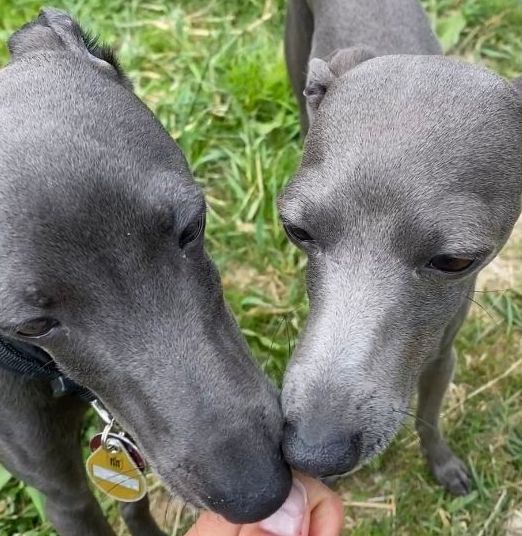
But not all grey Italian Greyhounds are only grey. Some may look grey at first glance but you will see somewhat of a golden reflection in their coat especially in sunlight (normally behind the ears and on the shoulders).
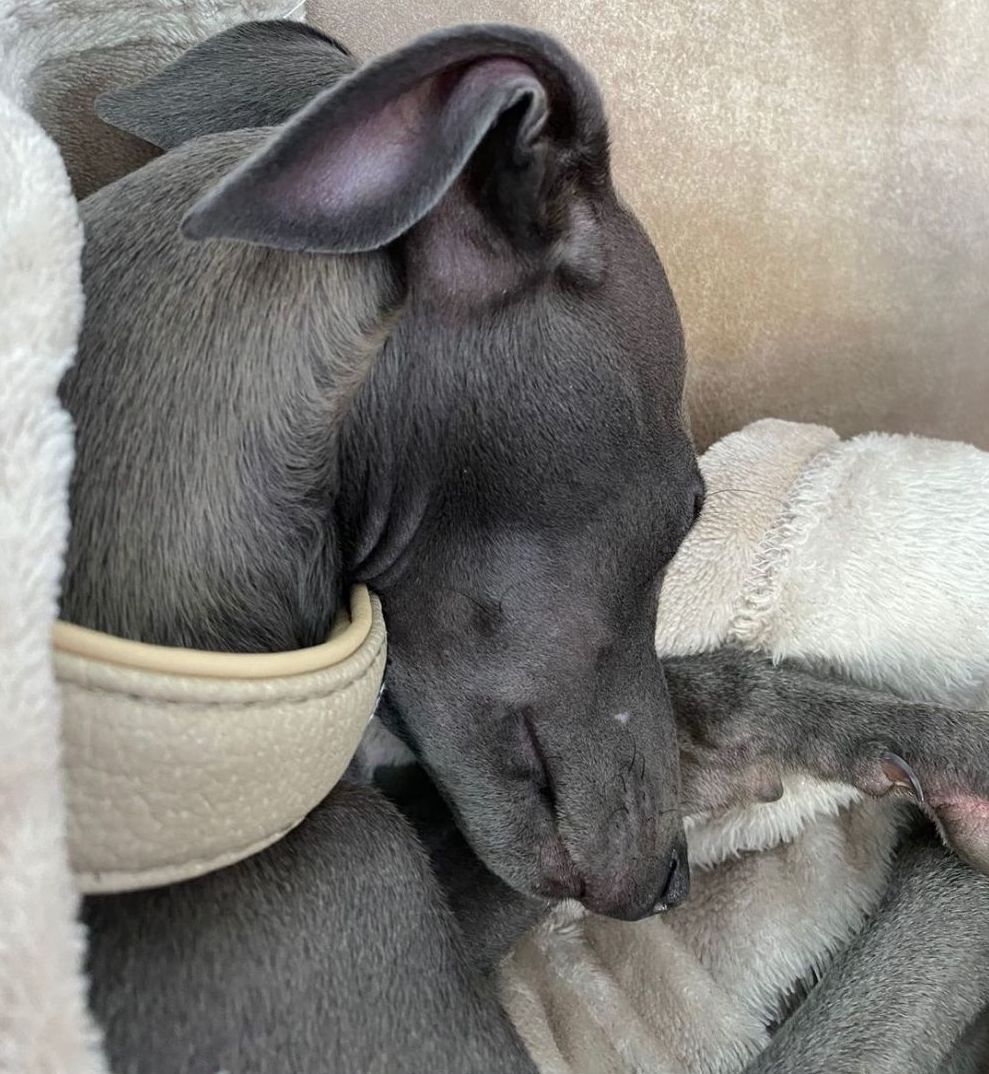
Grey is a beautiful color but just like other diluted colors a condition called “color dilution alopecia” can occur. Read on to find out more about this topic.
Isabella or Fawn Italian Greyhounds – So much variety!
Next, there is isabella (or often referred to as “fawn”). This color comes in the biggest variety and can be found in all kinds of shades from super pale (almost white) to yellowish, beige and red.
We will give you a few examples of different shades of isabella:
The first one is a mix between grey and isabella. Iggies with this color sometimes appear more fawn and sometimes almost full grey, depending on the lighting.
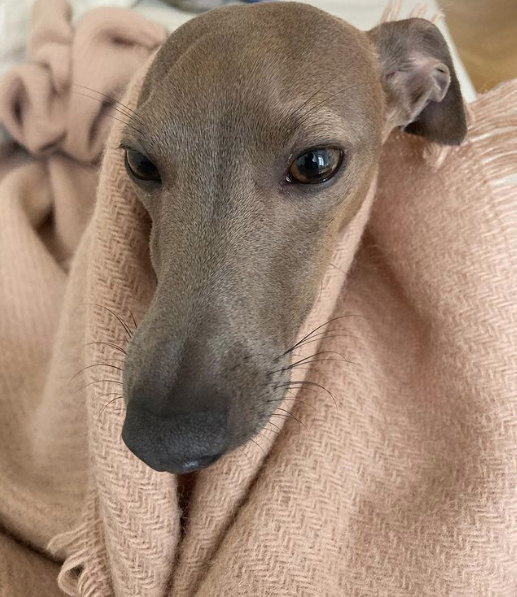
The most common shade of isabella is probably this one:
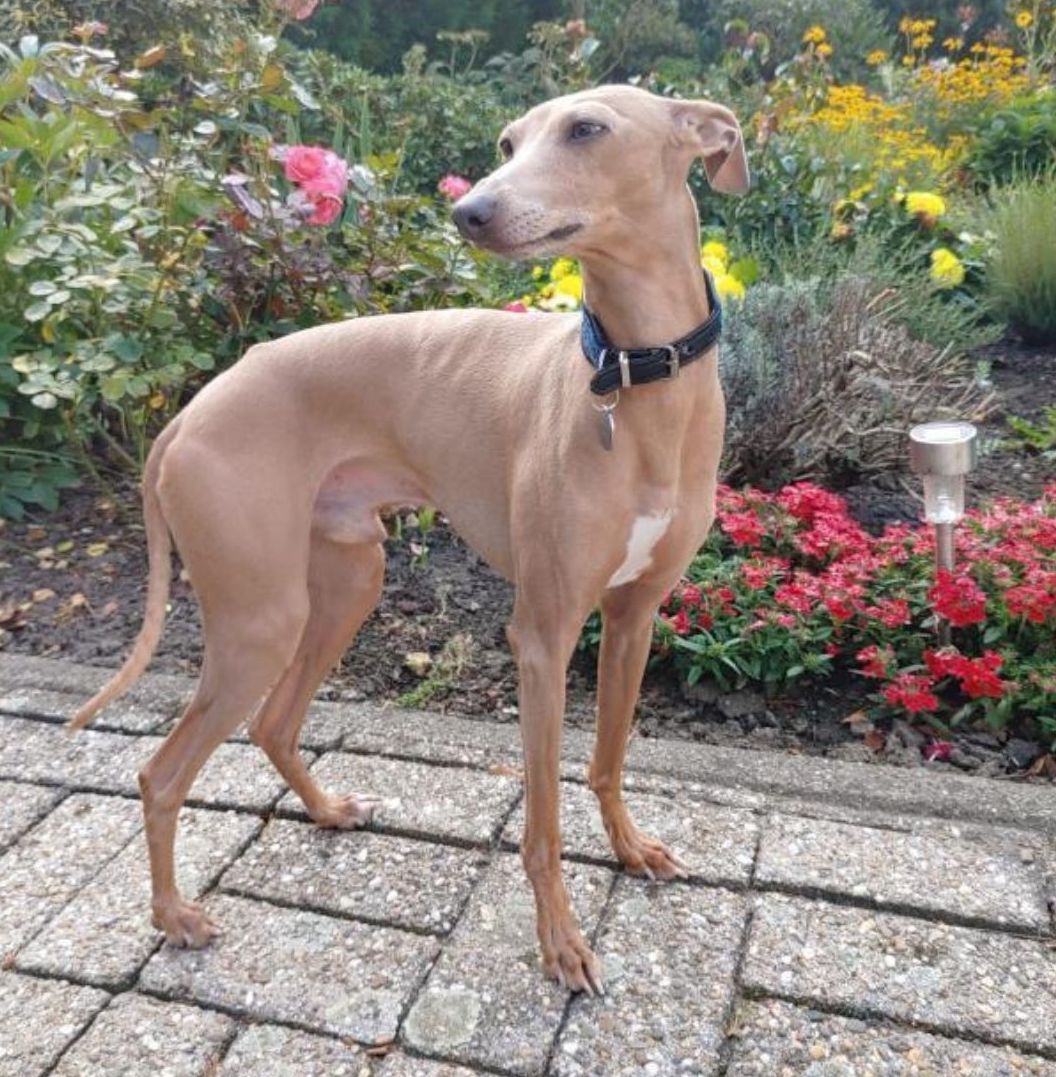
And here is another beautiful example with a bit of a warmer shade:

Sometimes isabella colored Italian Greyhounds are a bit darker. Here is a beautiful example of a warm, almost honey-like fawn Iggy.
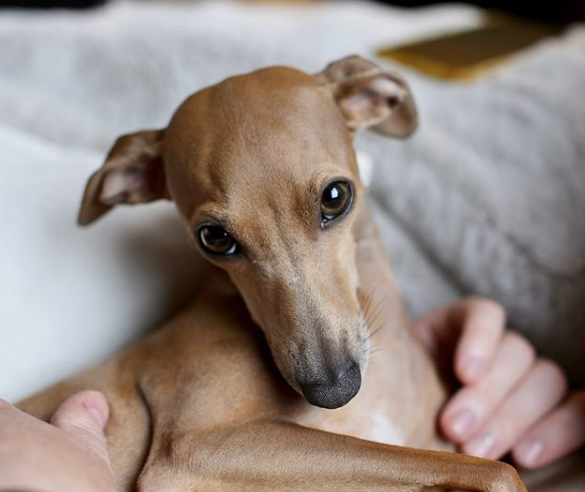
But there are even darker shades with darker pigment in nose and eye rims, often referred to as red:
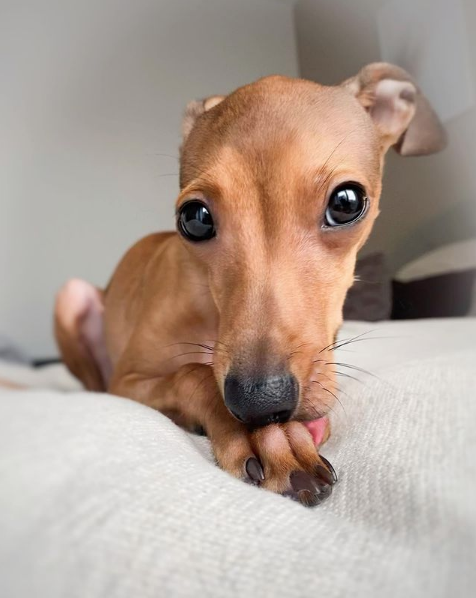
Lastly, you will sometimes see a super light shade often referred to as “cream”. It almost looks like it’s white – but it’s not. While the color white only occurs when pigment is lacking completely, Iggies with this color do have super light pigment. This shade is quite rare and also very popular at the moment. But no wonder, look at this cutie!
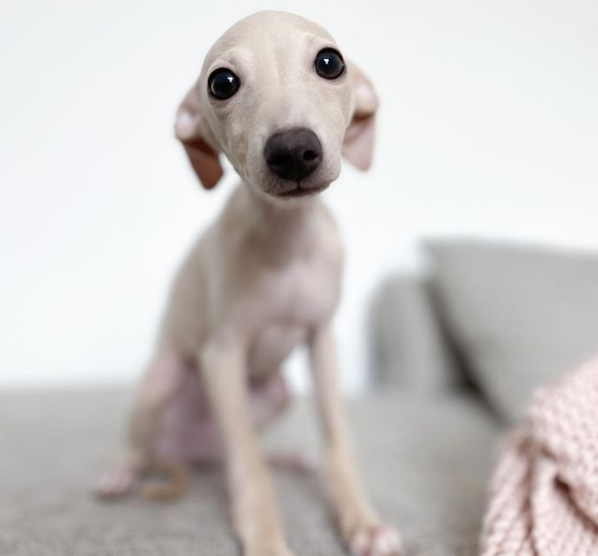
Another rare color variation is isabella with a mask. A mask is coat pattern that gives the appearance of a mask on the dog’s face. The hairs on the muzzle and sometimes eyes and ears are colored by darker pigment in
- grey or
- black.

Black – The darkest of all Italian Greyhound Colors
Of course also black appears in a few different shades.
A jet black coat is very rare. Only very few Italian Greyhounds have a pure solid black coat with no hint of other colors like this one:

Doesn’t it look super sleek and elegant? Here is another beautiful example of a black Italian Greyhound with white markings on the chest:
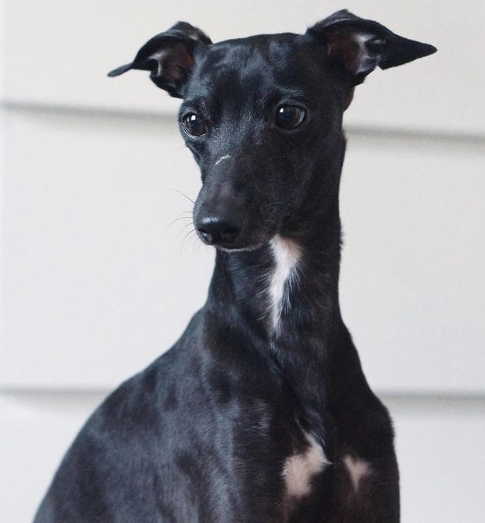
Most black Iggies have a more brownish color (also referred to as “seal”). This color appears black but depending on the lighting you will see lighter hair shine through.
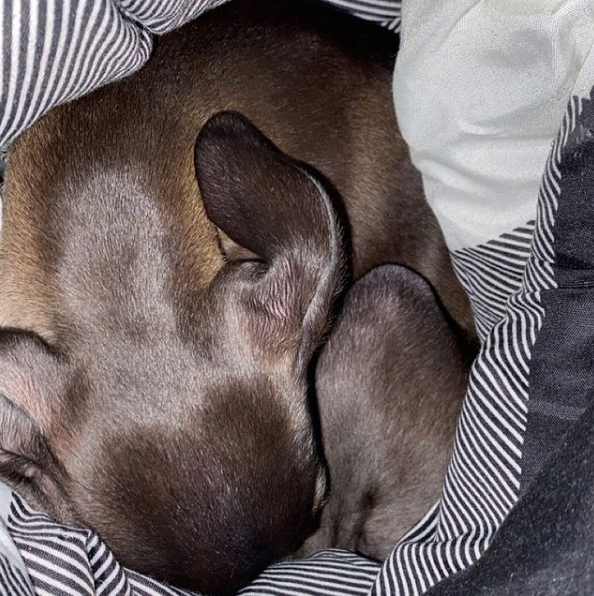
And very rarely you will find brown, almost chocolate looking Iggies. Yummy!

Which Italian Greyhound Colors will be Found in the United States and Other Countries Outside of Europe?
In the United States and other countries outside of Europe you will find all colors mentioned above with any markings but brindle or tan.
You will see a lot more white while solid colors are quite rare. Common patterns are Irish and pied.
Irish – Cute and elegant
Irish is a white pattern with a collar of white which does not go too far down the legs or onto the head.
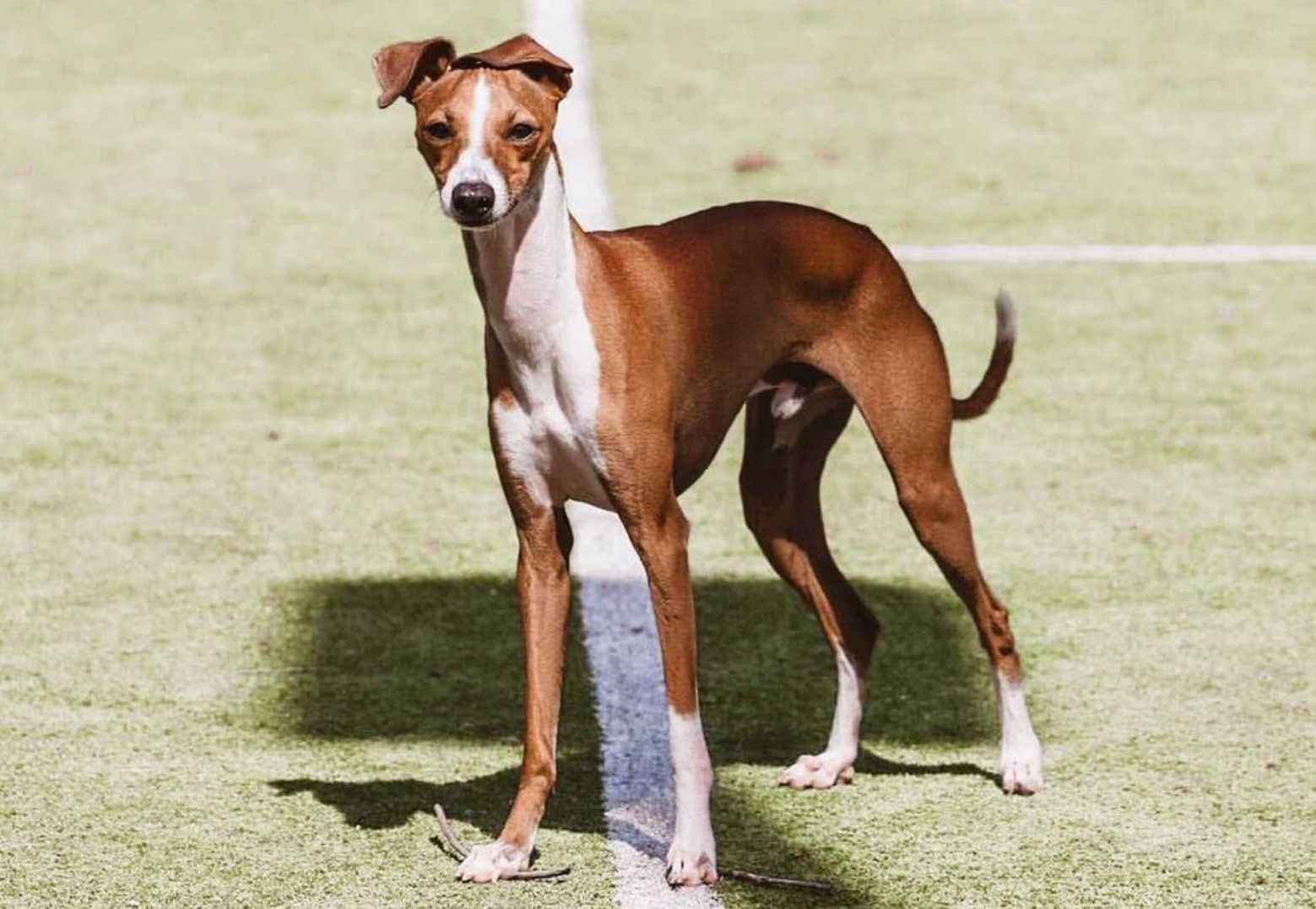
When the white parts go further up the neck it’s called “wild Irish”. Here, the white parts of the pattern have extended past the neck and/or covering the dog’s legs completely:
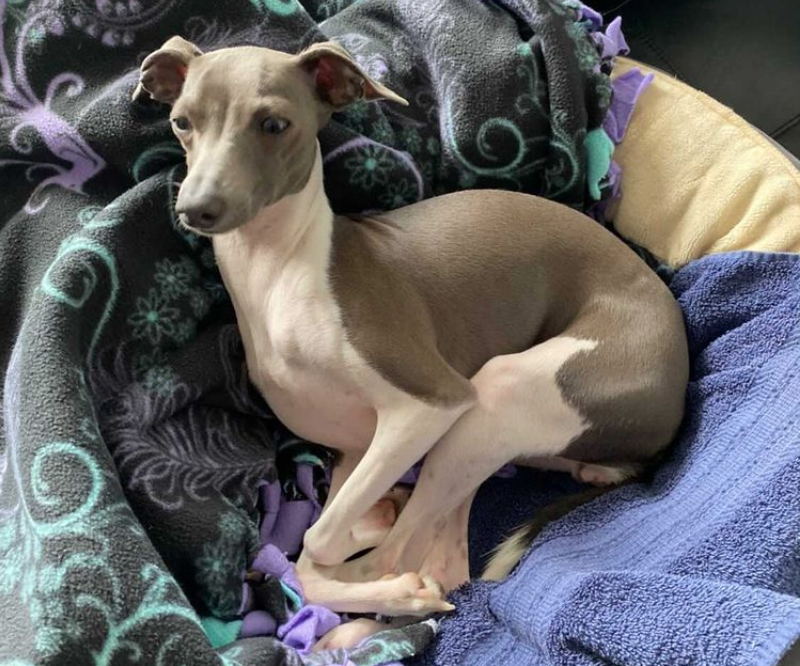
Pied – The typical American Iggy type
This pattern is very common in the American Iggy type. The dog is white with splashes of any color (large or big) covering any part of the body.
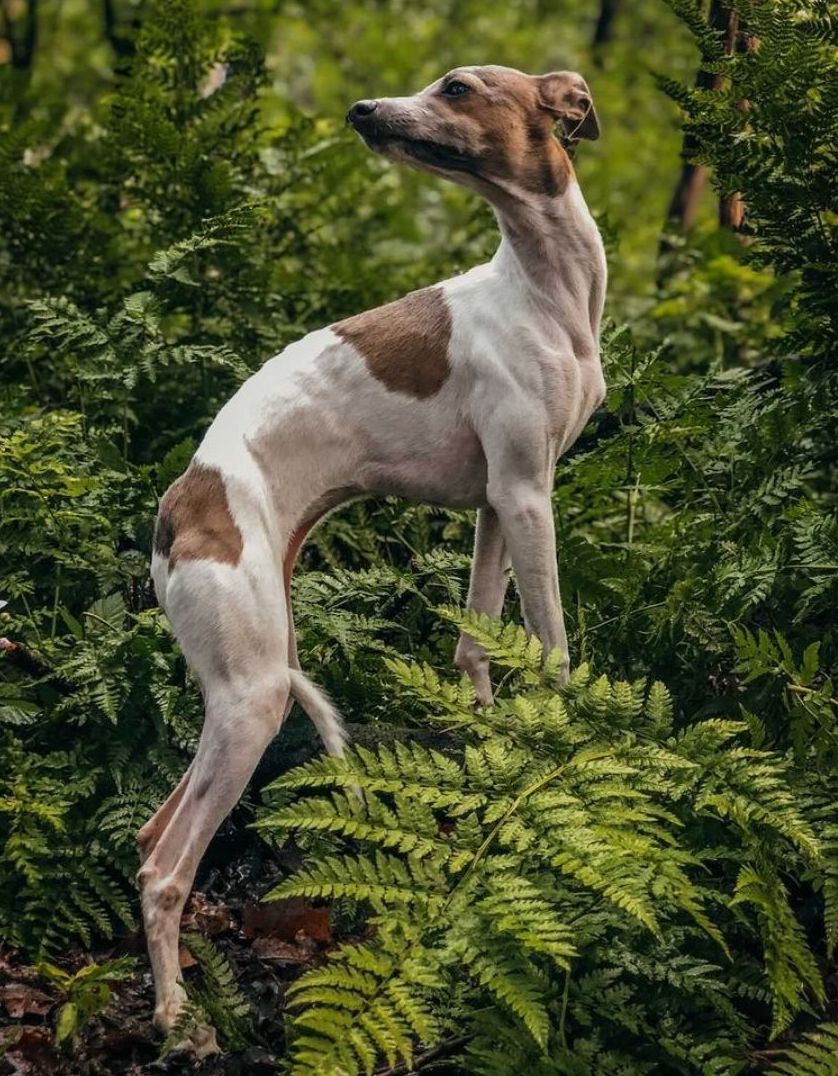
Here is another variation of this pattern with mostly white, a dark face and only a splash on the back.
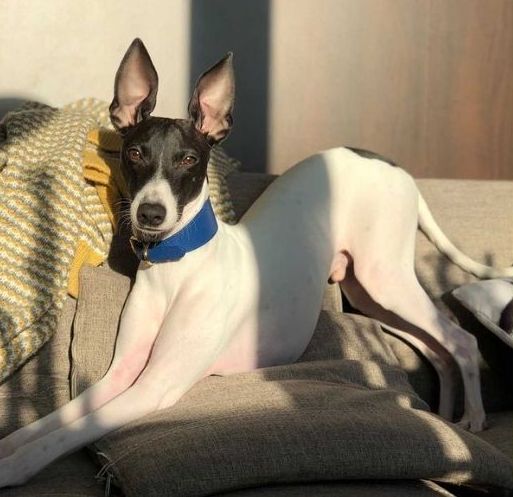
The patterns may have some of the following features:
- Ticking marks – It is often seen that the white parts develop cute little dark spots over time. Ticking marks, as they are called, appear underneath the coat and do not affect the color of the overlying hair.
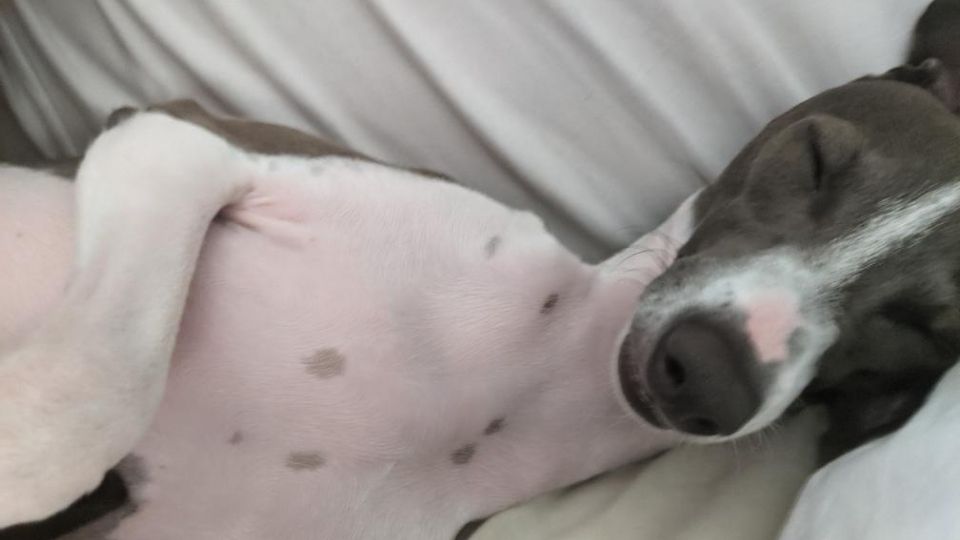
- Split face – A split face is a face that has two sides each with a different color.
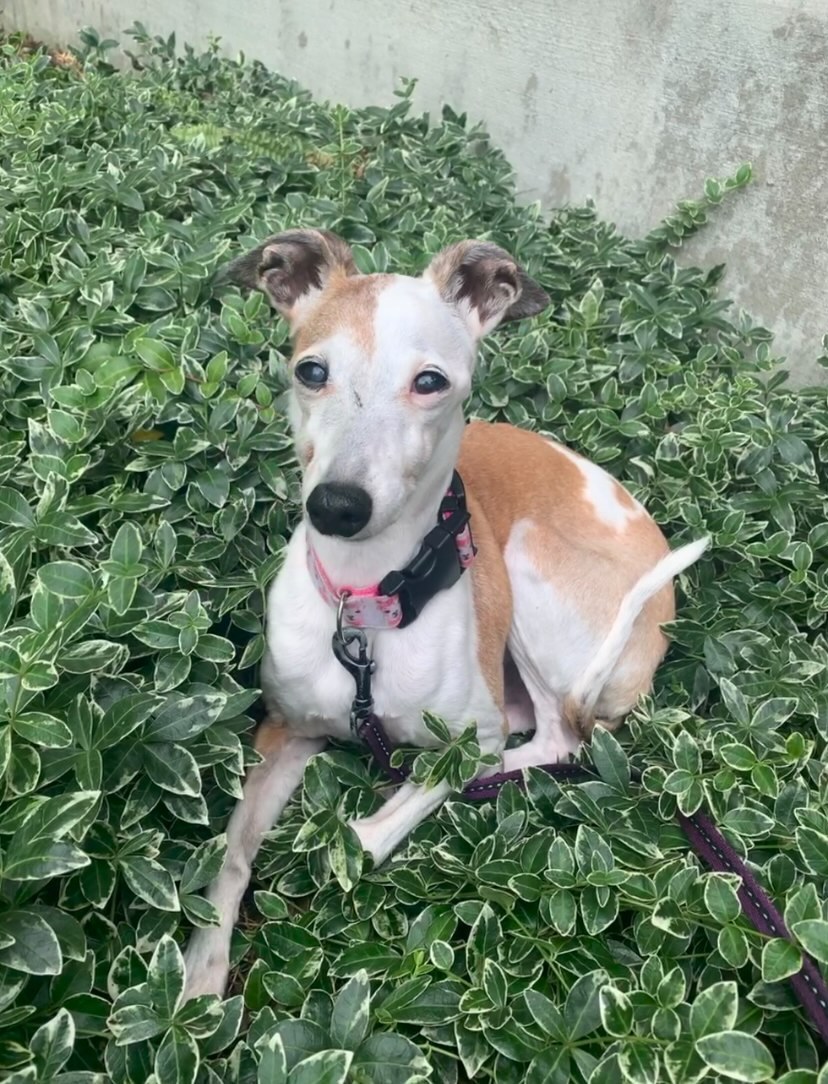
- Solid colored face or head – Very rarely you will find a solid colored head or face with no disruptions in the color at all.
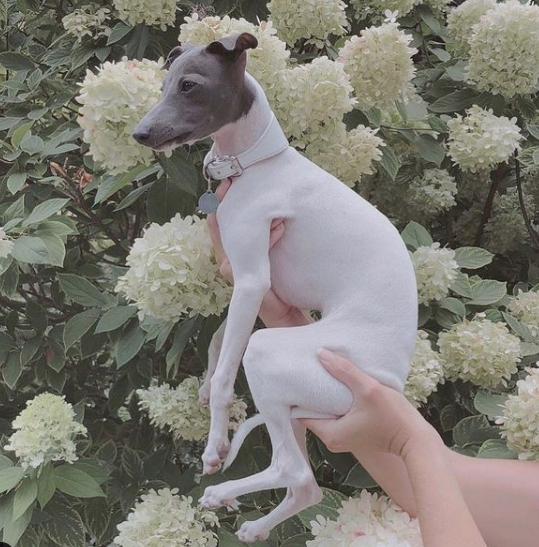
Problems with Diluted Colors – What is Color Dilution Alopecia (CDA) and What are the Symptoms and Causes?
While diluted colors like blue and some shades of fawn/isabella are very popular at the moment, you should know that dogs with diluted pigment may develop a condition known as color dilution alopecia (also called CDA).
What are the Symptoms of CDA?
A dog’s coat with CDA will slowly thin out and the dog will eventually even go entirely bald.
You won’t know if your puppy is carrying the CDA gene. Normally it starts between 6 months to 3 years of age with hair loss down the middle of the back from head to tail (above the spine).

Unfortunately there is no cure for CDA. But the good news is: It’s only an external condition that won’t affect the dog’s life expectancy at all.
Dogs with CDA might need to wear clothes more often and sometimes have skin problems like dry and flaky skin because of the lack of hair. Their skin also needs to be protected from sunlight. Other than that they can live a normal happy life.
However, it is definitely something you should know and take into consideration especially when choosing a grey/blue puppy. As it’s a hereditary condition, ask your breeder if there are any known cases of CDA in the lines he uses. A good and responsible breeder won’t mind to talk to you about this.
Does the Color of Italian Greyhounds Change?
Yes the color may change and there are many different reasons for that:
- Change over time – It is common especially for isabella colored Iggies that their coats will grow lighter. But it’s very hard if not impossible to predict if that will be the case.
- Seasonal change – Also, some colors are subject to seasonal change. That means that some Iggies look a bit different during summer than they do in winter.
- Environmental influences – You might have noticed that some Iggies, especially lighter colored ones, have reddish stains underneath their eyes or around the mouth. This may be caused by saliva or tear fluid.
- Change with age – Lastly, they turn grey (or white) as they get older. Some start turning grey around their first birthday and others don’t have one single grey hair even when they are 7. Of course you will notice grey hair more in a black or blue dog than in a cream one.
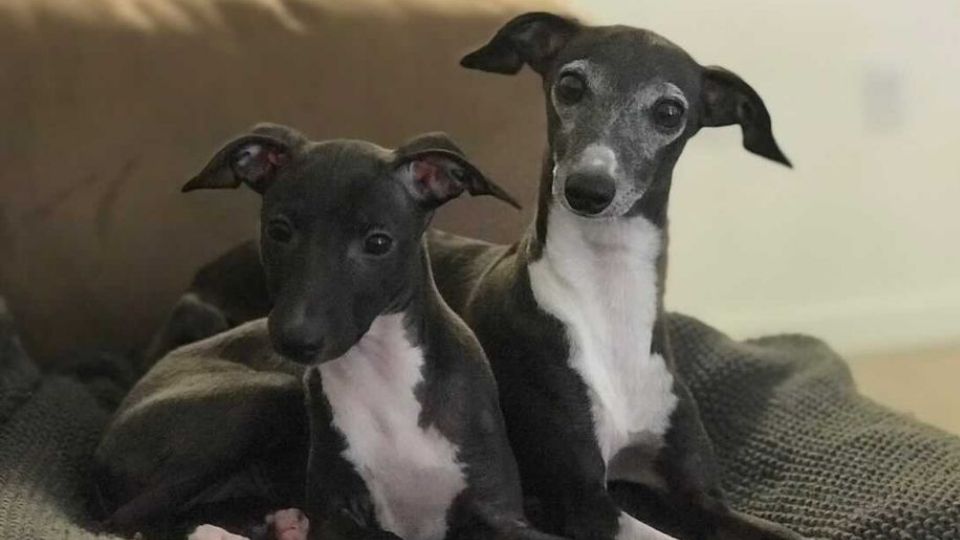
Here is another example of a cute senior Iggy who has turned quite grey already.
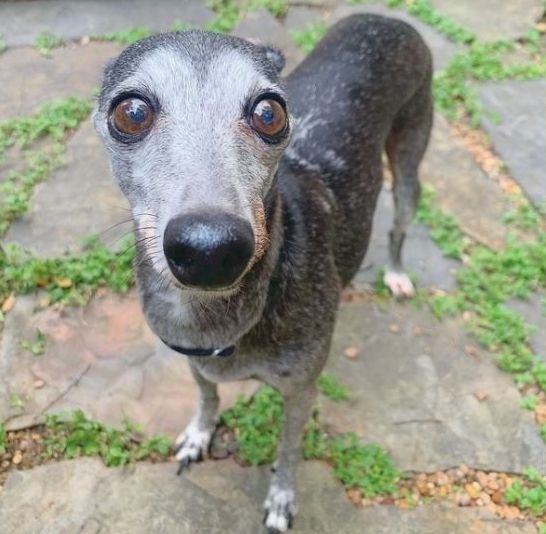
Don’t Choose an Italian Greyhound Based on the Color Only – They Are So Much More!
To finish this blog post we just want to stress that you should never choose a puppy because of the color alone. While we do understand that the color is usually the first thing you notice and you probably already have a specific color in mind when looking for a pup, there are so many more things to take into consideration.
Just because you think a dog is pretty or cute doesn’t mean it’s a good match for your lifestyle.
Besides, there really is nothing that can go wrong with any color. Italian Greyhounds are amazing, no matter if they are black, grey, red or purple.
Conclusion on Italian Greyhound Colors – All Iggies Are Beautiful!
There are so many different shades and it’s impossible to cover them all. But hopefully this blog post gave you a good overview of what Iggies can look like.
A huge thank you goes out to all our Iggy friends on Instagram who let us use their beautiful photos. Without them this would have not been possible.
We’ve placed the link to their Instagram accounts underneath the photos so you can go check them out. And leave a few likes while you are there!
